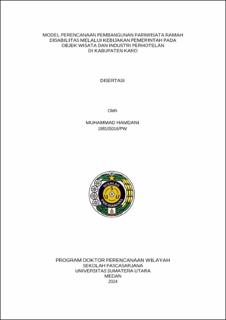| dc.description.abstract | The purpose of this study is basically to determine the direct and indirect effects of
tourism development planning using accessibility and inclusiveness towards disability friendly tourism through government policies in the field of Tourism Objects and the
Hospitality Industry in Karo Regency. The method for analyzing the data in this study
used descriptive statistical analysis with SPSS 21 software for windows, and structural
equation modeling – partial least squares (SEM-PLS) analysis with smartPLS 3 software.
The results of the study explain that tourism accessibility has a positive and significant
effect on government policies, inclusive tourism has a positive and significant effect on
government policies, tourism accessibility has a positive and significant effect on
disability-friendly tourism, inclusive tourism has no positive and significant effect on
disability-friendly tourism, government policies have an effect positive and significant
impact on disability-friendly tourism, tourism accessibility has a positive and significant
effect on disability-friendly tourism through government policies, and inclusive tourism
has a positive and significant effect on disability-friendly tourism through government
policies on Tourism Objects and the Hospitality Industry in Karo Regency. Meanwhile,
the findings of a disability-friendly tourism development planning model on Tourism
Object and Hospitality Industry in Karo Regency, where the factors that need attention,
namely: first, tourism accessibility including social issues, weather, development,
management, actions, decisions, stimulus, psychological, cognitive, interpersonal, and
treatment; second, inclusive tourism including representation, participation in decision
making, promotion, respect and understanding, removing social barriers, coordination,
supervision, responsibility, collaboration, integration, and digital literacy; third,
government policies including regulations, incentives, social responsibility, clarity,
convenience, policy formulation, decision making, policy implementation, and policy
evaluation; fourth, disability-friendly tourism including information, management of
tourist destinations, preferences for accommodation information, accommodation, easily
accessible facilities, availability of disability support services, legal certainty, destination
environment, and demographic profiles. | en_US |


